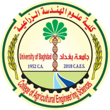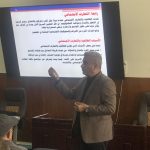The Role of the College of Agricultural Engineering Sciences in Serving the Community
The College of Agricultural Engineering Sciences plays a crucial role in serving the community through various fields and activities aimed at improving the quality of life and supporting sustainable development. Its roles can be summarized as follows:
A. Education, Training, and Graduate Qualification
- Preparing Specialized Personnel: Training professionals in various agricultural fields, such as crop production, animal production, food science, natural resources, and agricultural extension.
- Providing Training Programs: Conducting workshops and training sessions for farmers and workers in the agricultural sector to enhance productivity using modern methods.
B. Scientific Research and Development
- Conducting Research: Performing scientific studies to improve agricultural techniques and increase crop yields.
- Developing Solutions: Addressing environmental challenges like water scarcity, climate change, and pest control.
C. Supporting Rural Development
- Providing Agricultural Extension Services: Offering guidance to rural communities to raise awareness about best agricultural practices.
- Supporting Small and Medium Projects: Encouraging agricultural and food industry ventures to increase income and improve living standards.
D. Environmental Protection and Resource Sustainability
- Promoting Sustainable Farming: Introducing techniques that minimize the use of non-renewable resources and reduce pollution.
- Raising Awareness: Highlighting the importance of biodiversity conservation and the responsible use of agricultural land.
E. Enhancing Food Security
- Producing Quality Crops: Contributing to the production of high-quality and affordable crops to achieve self-sufficiency.
- Improving Storage and Processing: Enhancing agricultural storage and processing to reduce food waste.










